The Great Connecticut Farm Hop
Discover the Nutmeg State’s bounty of homegrown food, gifts, and holiday fun.
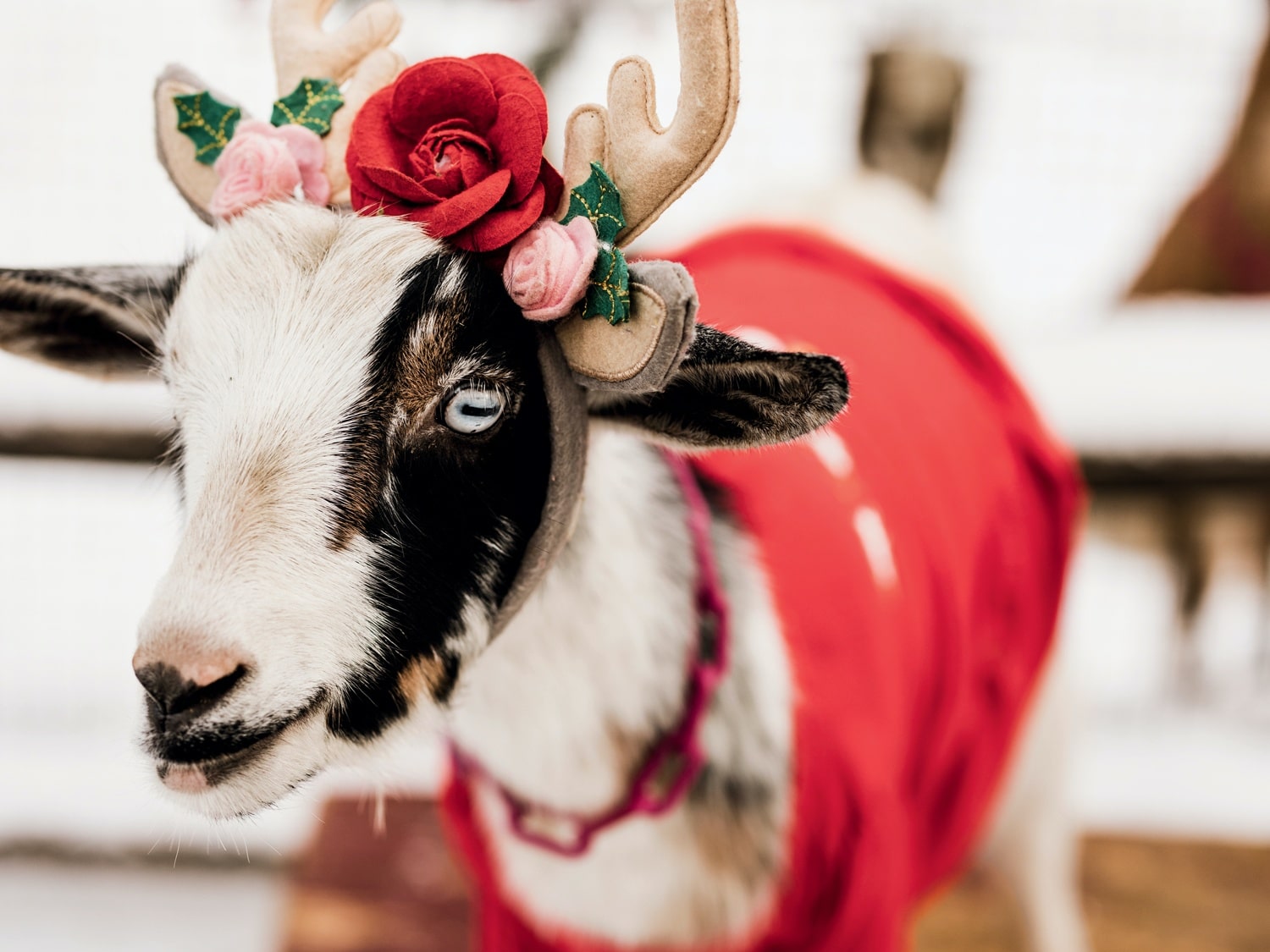
Sadie, a 3-year-old Nigerian dwarf goat, is all dressed in her jolly best at Bradley Mountain Farm in Southington.
The night we dressed goats in pajammies is crystal clear in my memory, even though my cellphone photos are blurred. It’s tough to capture sharp shots when goats in fleece hoodies, frilly nighties, sparkly headbands, and tutus are super interested in the bag of feed in your pocket.
It was my daughter Lara’s 16th birthday, a late-October night five years ago, and she had no clue what was in store when we turned through the stone-pillared entryway to Bradley Mountain Farm in Southington, Connecticut. Her best friend, Hannah, met us there—another surprise. And the two of them rolled on the floor and laughed themselves silly as they came nose-to-nose with these rambunctious playmates. With a dozen-ish other families, we finally corralled the four-leggers for a bedtime story, but our circle collapsed into squeals and giggles when one of the littlest goats took a bite out of Goodnight Moon.
Moments of immersive joy and mildly controlled chaos like this have been part of farm life here ever since owner Anneliese Dadras realized customers didn’t covet just her glittery goat-milk soaps (sold at farm events and online at bradleymountainfarm.com). They also craved time with these affectionate creatures. Since the first Goat Walk, Dadras has added year-round programs like Goats N’ Pajamas and Goat Cuddle Therapy. During Covid shutdown, she learned how much her growing herd—now 50 strong—was enriched by the interactions, too. “They would line up at the fence,” she says, “and watch the road” as if wondering, When are they coming?

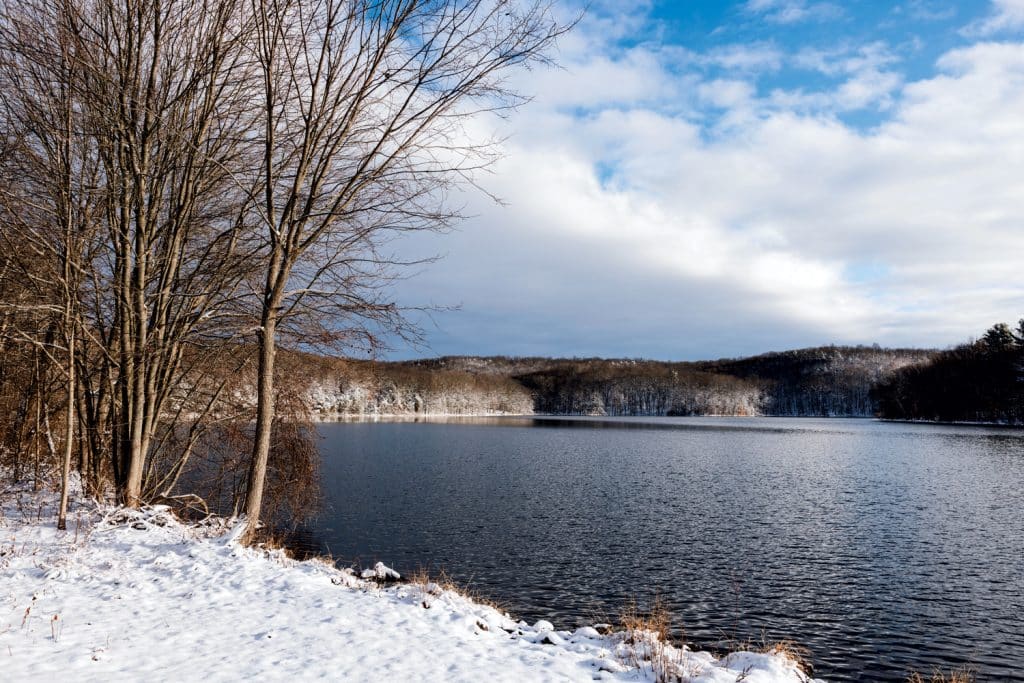
Photo Credit : Michael Piazza
You can bet Dadras’s flock is anticipating this holiday season with the giddiness of, well … kids. On the farm’s Holiday Nights, visitors sing seasonal songs to the goats in the barn, sip cocoa with Santa in the Bradley House, and select colors and fragrances for their own goat-milk soaps. Reindeer Goat Photo sessions are popular, too, luring families from beyond Connecticut’s borders. Each goat has a personality that determines its “job.” Kalimba, for example, is treat-motivated to stare right at the camera for winning holiday-card photos. She wants nothing to do with Goat Yoga. But she recently filmed an auto commercial.
Dadras had been farm shopping for 10 years when this 200-year-old-plus lakeside former dairy on the National Register of Historic Places became available in 2015. Three doors down from where she lived, it was a place she’d biked past as a child, always wishing she could get a closer look, never imagining she’d one day call the Robert Adam–style farmhouse home. More than anything, she wanted to preserve the property from development and open it to the community. “I just intuitively knew that if I hoarded this place, it wouldn’t work,” she says. “The house, the icehouse, the goats—they all needed to be shared. That was the magic of it.”
She’s one of a group of farmers throughout this small state who are cultivating delight as a contemporary means of sustaining agricultural lands. Instead of hibernating during the final months of the year, their efforts ramp up. Cruise from farm to farm, and you’ll find Connecticut-grown and -made gifts, fresh Christmas trees, spirited beverages, and foods and flowers you’ll be proud to set on your holiday table. At a time of year that can feel frantic, you’ll also find the sort of peace and contentment that can’t be bought: You have to harvest it yourself.
Maple Row Farm | Easton
Bundle up your family (your leashed dog, too). Load up the cooler and grill. Download the app. In the town that brands itself the Christmas Tree Capital of Connecticut, Maple Row Farm makes the annual choose-and-cut outing feel as momentous as game day. If you’re a football fan, you know what to expect when you pull into one of two designated tailgating areas. Revelers go all out with festive spreads, music, matching attire, decorations. But don’t lose sight of why you’re really here: the quest for the perfect tree and for family memories your children will one day pass on to theirs.
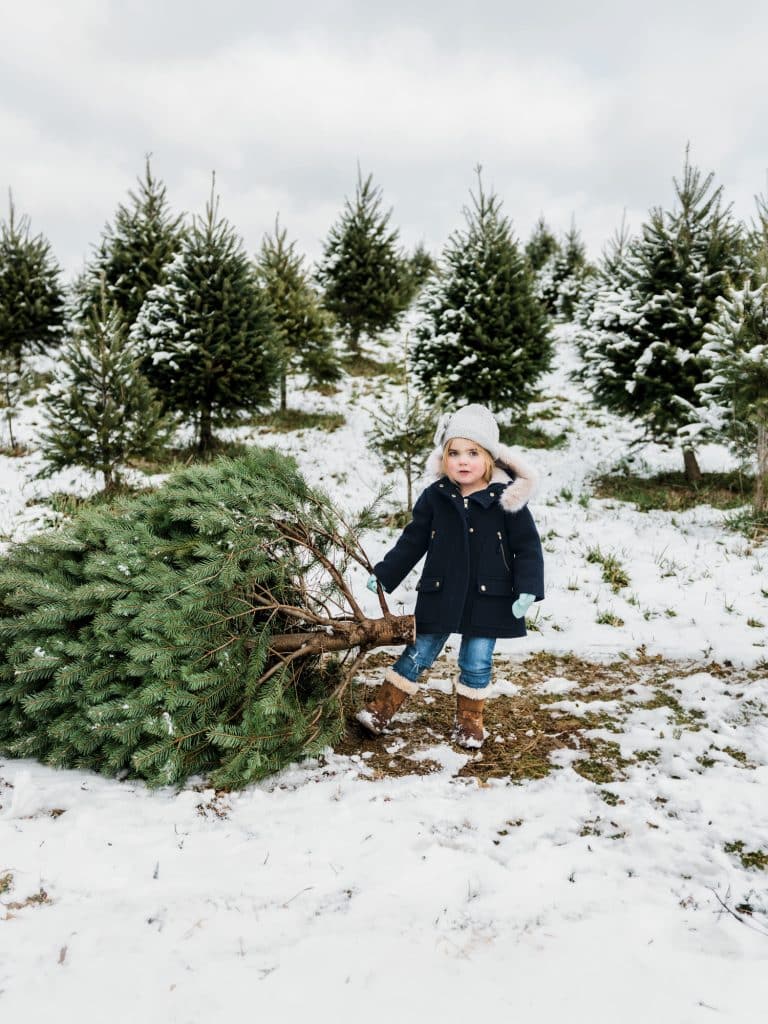
Photo Credit : Michael Piazza
Brothers Scott and David Edwards run the family’s 1769 farm. Their grandfather planted the first trees as a 4-H project. Their dad made the call to go all in on this eight-years-to-reap-profits crop, which now carpets nearly half of the farm’s 260 acres. Douglas fir, Canaan fir, blue spruce, and orange-y smelling concolor. Visit during the week to quietly stroll this pine-scented wonderland. Weekends, starting right before Thanksgiving, are a different story, though. David Edwards laughs when asked about the tailgating tradition that’s been part of the scene for the past three decades. “It is what it is.” mrfarm.com
Glendale Farms | Milford
Poinsettias are almost as synonymous with the holiday as Christmas trees. Here you find a greenhouse filled with 12,000 of these potted red and pink beauties. Even popular white varieties seem to glow with color.
Tim Astriab’s family has owned Glendale Farms since 1917. That makes poinsettias, cultivated here for more than 40 years, a relatively recent addition to the flower nursery’s offerings. Purchasing them—with cash or check—directly from the farm is still a best-kept secret unless you’re a church decorator or interior designer. Get there on a weekday or Saturday morning in late November or early December for the most eye-popping photos and the best selection of plants in five sizes, all with a vitality that comes from loving care. “When they’re gone, they’re gone,” says Astriab, then adds, “I’m glad.” glendalefarms.com
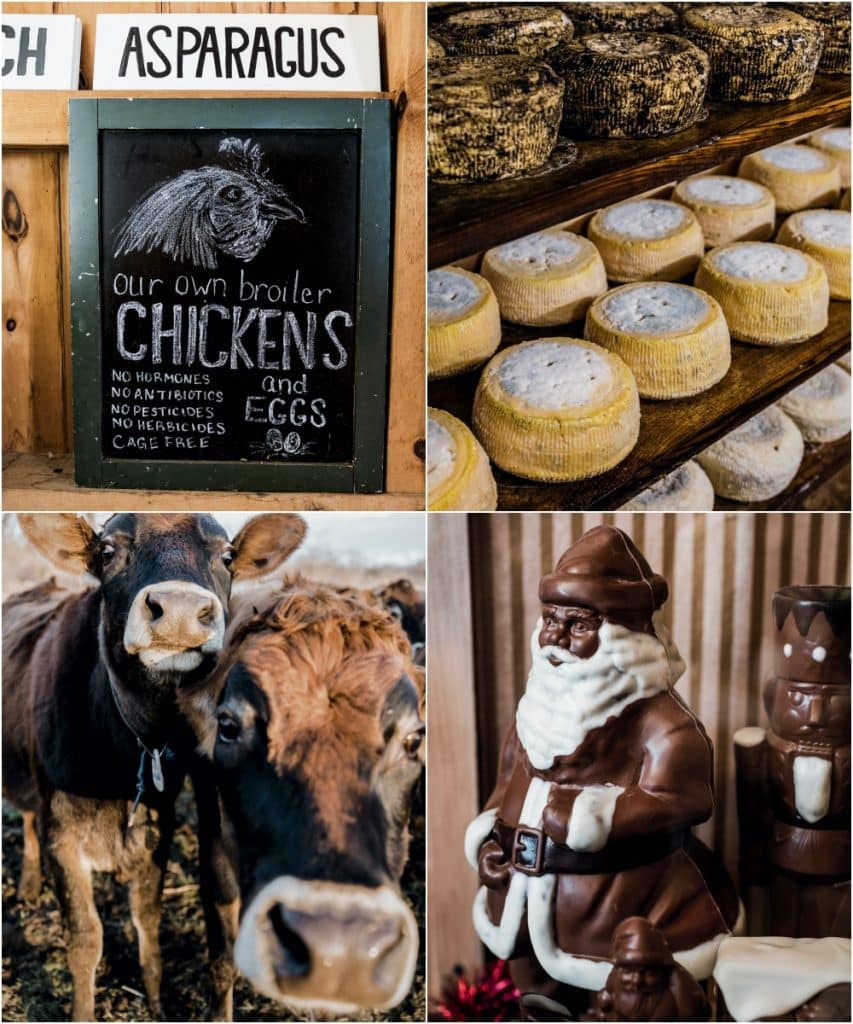
Photo Credit : Michael Piazza
Woodstock Creamery at Valleyside Farm | Woodstock
Picture this: You plop down on a bale of hay with a container of maple skyr, made with real syrup and whole milk from the cows in the barn over yonder. Then, Santa and Mrs. Claus saunter by, shooting the breeze, because it’s not quite time for the surge of kiddos to arrive. It could happen to you when you visit Woodstock Creamery on the second Saturday in December during the town’s annual Winter Festival.
Angela Young’s family has been tending this land for 11 generations, but the on-farm creamery dates back only five years. There are echoes of the past in its warm-spirited community focus, however: There was a co-op creamery here that served locals from the late 1800s until a century ago.
Bring a cooler. Claus encounters may be rare, but seven days a week you can load up on skyr—an Icelandic-style yogurt that is über-creamy and dense—in seasonal flavors including pumpkin. Holiday guests will love a dollop on pie, paired with farm-fresh eggnog or coffee milk. Bring home spreadable labneh cheese and skyr dips in sweet and savory flavors, too, and you’ll be company-ready with conversation-starting appetizers. woodstockcreamery.com
Watercure Farm Distillery | Pomfret Center
You don’t have to be a spirits drinker to appreciate the coziness and convivial vibe inside the tasting room at Connecticut’s first farm distillery. Daniel and Aubrie Nagy brought this post-and-beam vision to life on the grounds of the former Gwyn Careg estate, where the heiress to the Murray bicycle fortune once kept an elephant and giraffes. You can hike, snowshoe, or bike from here across town-owned farmland to the Airline Trail.
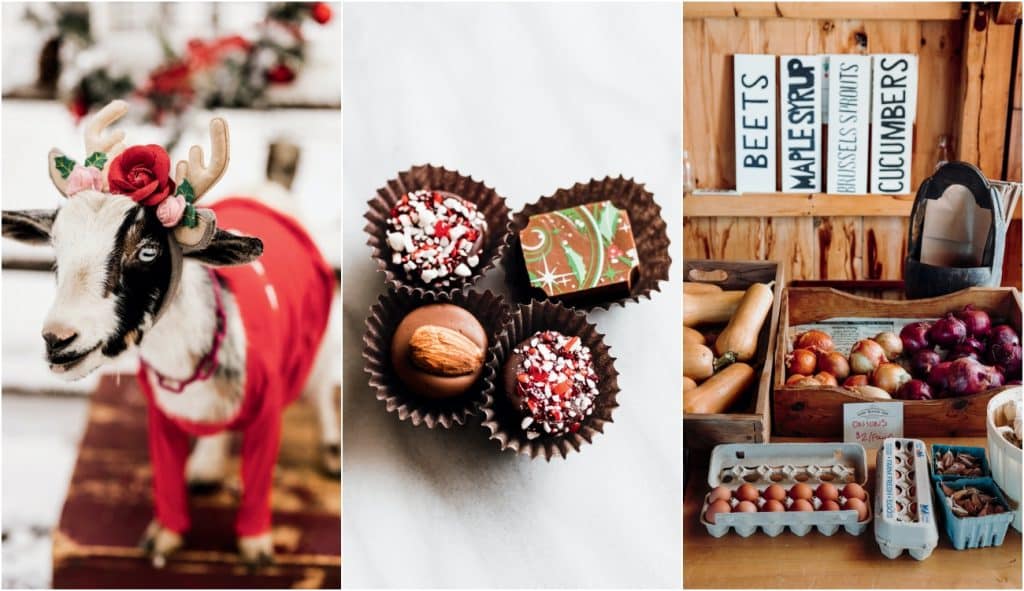
Photo Credit : Michael Piazza
When the Nagys began selling their handcrafted spirits in 2019, they grew about 70 percent of what went into the distilling operation visitors observe through large glass windows. But demand for their whiskeys, gin, flavored vodkas, and brandies has soared, so while they still grow ingredients for infusing signature products like shiitake mushroom vodka, they source from other Connecticut farms now, too. Pristine water, an essential component of fine spirits, comes right from the property’s deep well.
Tastings are an educational experience. “Sometimes we’re making a mash. Sometimes we’re distilling. Sometimes we’re just up front talking about what’s in your glass,” says Daniel Nagy. But it’s cool if you’d rather sit at the bar sipping cocktails and playing cards. Or if you’re just stopping to purchase gifts such as apple spice rum, a holiday favorite available in 200 ml bottles perfect for stocking stuffing. watercurefarm.com
Indian River Shellfish | Madison
“Long Island Sound is a historically rich natural habitat for oysters,” says Mike Gilman, who co-owns Indian River Shellfish with lifelong friend George Harris. For native peoples, the bivalves were a food staple. By the early 1700s, commercial shellfishing was under way, and by the late 1800s Connecticut had been crowned oyster capital of the world. Still, it took the duo—a biologist and a lobsterman—years of trial and error to perfect their Hammonasset Point Oysters.
“We grow in the Hammonasset River, which is more fresh than salt,” Gilman says. That gives these oysters—suspended in cages, never touching the bottom—a sweet taste: far less briny than those harvested off Cape Cod, for example. Connecticut has oyster outfits with outputs in the millions. Gilman and Harris raise only about 150,000 of these babied beauties each year, and you can buy them right from the farmers at their dock, a stone’s throw from Hammonasset Beach State Park. Gilman likes them best during the last few months of the year, when they’re bulking up for winter, and colder waters keep them naturally refrigerated. Your window for observing the landing and sorting, and for scoring some of the freshest oysters you’ve ever slurped, is Friday afternoon and Saturday morning. Reserve online, especially if you have a big order, but know that a dozen or two can usually be purchased on a whim. indianrivershellfish.com
Fox Farm Brewery | Salem
Zack Adams and his wife, Laura, saw potential in an abandoned, overgrown 30-acre farm down the road from her family’s small vineyard. With their confidence bolstered after Zack’s 2012 victory in the national Samuel Adams Longshot American Homebrew Competition, they scooped up the property in 2013. “It needed a new lease on life,” he says. “From the moment we moved here, a brewery was the highest possible use and our greatest hope” for the siloed barn, which had sat vacant for 30 years.
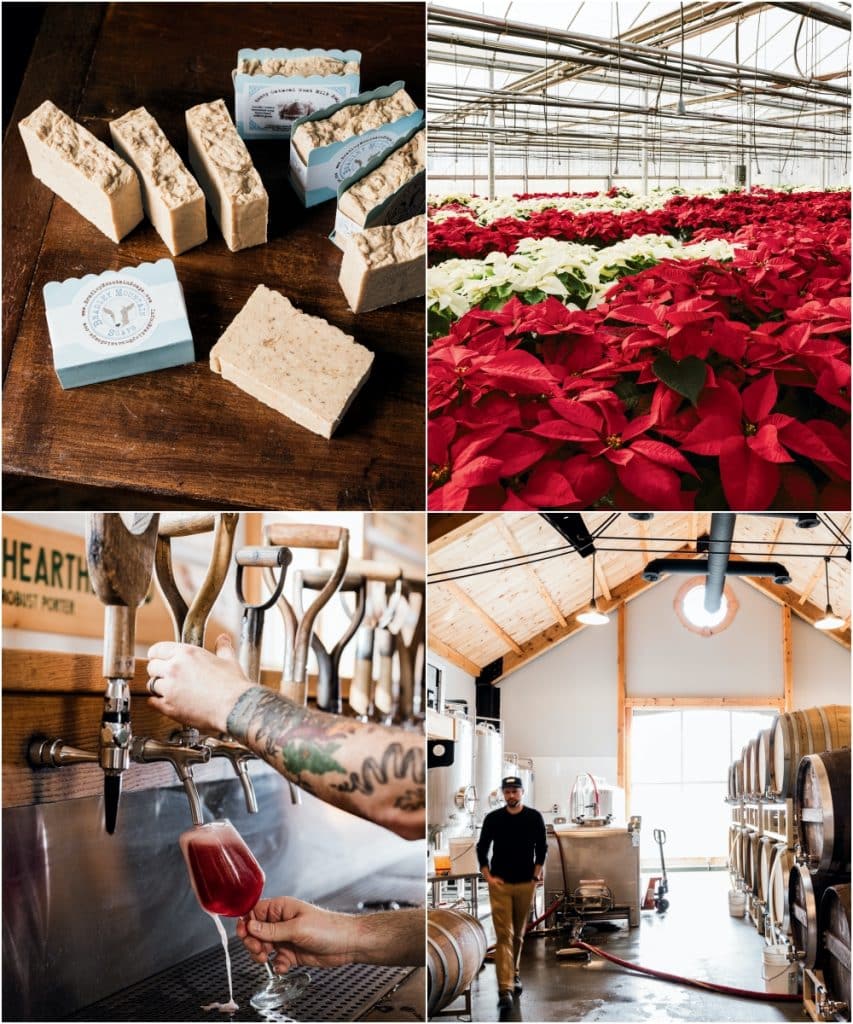
Photo Credit : Michael Piazza
Their dream came true in 2017. With seating on two floors and an open view into the brewing operation, the tasting room in the red barn is a clubby place for beer enthusiasts to sample European traditional styles and spontaneous “wild” ales that reflect this locale. The stone-facade Barrel Barn is the sort of iconic holiday backdrop that would draw New England shutterbugs even if there weren’t, in those oak casks, beers like Avalonia Red, made with farm-grown cherries and raspberries. Or the blendings of wine-like Consonance and Dissonance: Spontaneously fermented with super-ripe, Connecticut-grown Aromella grapes, it boasts notes of peach, citrus, and clove that make it an ideal companion for turkey. Bring home bottles to gift wrap, too. foxfarmbeer.com
Cato Corner Farm | Colchester
If cheese is your favorite holiday snack, or if you want to wow someone with a Cheese of the Month Club membership, it’s comforting to know Cato Corner Farm’s online shop never closes. You’ll appreciate every morsel more, though, when you drive past stone wall–lined fields and pull up a brief hill to the unassuming farm shop, stocked with cheeses and all their tasty accompaniments. Open Friday through Sunday, it’s a destination where you can taste, converse, learn, and truly appreciate the origins of these handcrafted farmstead cheeses. From young, bloomy-rind Celeste to sharp and complex Aged Bloomsday, each reflects the specific terroir of these lovingly tended 75 acres, where cows’ health and happiness is paramount.
Visit on a Saturday and, if weather permits, you can walk uphill and peer through an observation window as owner and head cheesemaker Mark Gillman and his team transform raw milk into young cheese … still at least 60 days and as much as a year away from being ready to eat. Gillman returned to the family farm a few years after his mom, Liz MacAlister, started making cheese seriously in 1997. These days, she milks less and manages more. She’s proudest, Gillman says, of the care that her 45 Jersey cows receive, and the sweet milk that results. “Good cheese starts with good milk,” he says.
To chat with Gillman is to understand what makes his cheeses so irresistible. There’s a playful drive to create, whether it’s a variation on a staple like the nationally lauded Hooligan, which he sometimes washes in beer from Fox Farm Brewery, or his first native culture cheese, Cornerstone. This year’s batch is aging in the cave. Come back as winter yields to spring for a taste.catocornerfarm.com
Thorncrest Farm & Milk House Chocolates | Goshen
Yes, chocolates grow on farms. At least the finest ones in Connecticut do. They’re delicately dispensed from a shop that seems so small beside the grand barn. The contrast makes sense once you understand what drives this farming family. It’s not Kimberly Thorn’s chocolate making nor her husband Clint’s wood furniture making. Working with sons Garret and Lyndon, and daughters-in-law Keri and Hope, their energy is concentrated foremost on providing a home for cows from birth until the end of an extraordinarily long life.
Thursday through Sunday, you can drift inside the stable, where there are always adorable calves to coo over this time of year. Clint Thorn designed the barn with airflow and natural light in mind: It’s oriented polar north-south. You sense the love here in the scent of top-grade hay. Each “lady” has a large mattress for comfort. If you want to knock Santa’s boots off this Christmas, bring a cooler so you can bring back the tastiest milk he’ll swig all night.
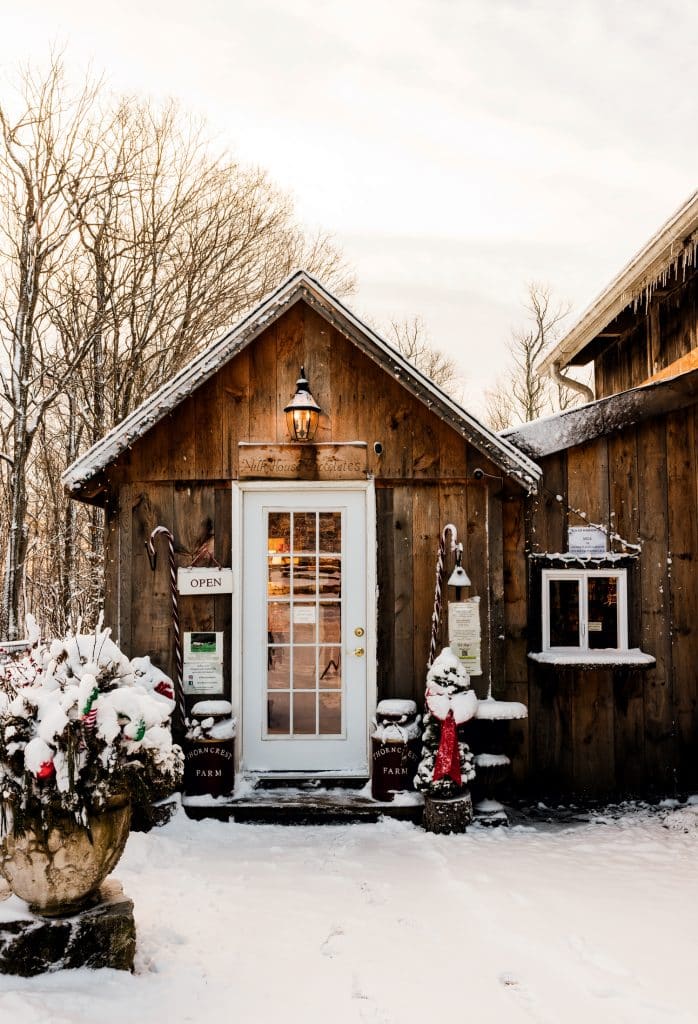
Photo Credit : Michael Piazza
But you’ve made the back-roads drive here for chocolates (order them online if you can’t visit). Perhaps a centerpiece-size solid pumpkin, turkey, or Santa. More likely the truffles and caramels that are as distinct as the cows you met in the barn. “We’re the only people I know of in the world who make single-cow-origin chocolates,” Kimberly Thorn explains. Handcrafted in small batches with fresh-that-morning milk from a specific cow, these all-natural creations have a flavor that can be traced to one cow’s individual feed, her inherent genetics, and the atmosphere in which she thrives.
For example, caramels all begin with a Jersey cow named Daydream. “Her milk is just so luscious,” Kimberly Thorn says. “It literally is buttery soft. It has nutty, complex flavor. It rolls off your tongue in a way you just want to lift your shoulders and say, ‘Ooh, that’s so good.’ And that’s why she makes the best caramels.” milkhousechocolates.net
Sunny Meadow Farm | Bridgewater
Pull up to this glorious farm just before sunset, and you are in for a show of color-streaked skies and backlit rolling hills. Opening the view, which had been blocked by hedges for some 20 years, was priority one for owner Steve Shabet. After some prodding from town officials, he purchased this neglected neighboring farm a decade ago to save it from development, becoming only about the fifth owner since the late 1700s.
If you miss the sunset, no worries. One of the coolest things about this producer of honey, maple syrup, pasture-raised chicken and eggs, orchard fruits, and 220 different vegetables grown using organic, sustainable methods is its honor-system farm market, open 24/7. If you have cash, a credit card, Venmo, PayPal, Apple Pay, or Zelle, some of the delicious makings of holiday meals and treats can be acquired here at any hour of the day or night. And wow, is it peaceful in the lead-up to Christmas compared with supermarkets or even Shabet’s enchanting Smithy Market in New Preston, where his own products commingle with others grown and made in Connecticut in a mid-19th-century blacksmith shop. sunnymeadow.farm
Aquila’s Nest Vineyards | Newtown
Walk through a winery wonderland where the moment darkness falls each night, rows of vines become the scene of a holiday light show set to music. Sip a glass of sparkling rosé or warm mulled wine made with the vineyard’s merlot, raw cacao for a hint of chocolate, and cinnamon and other spices.
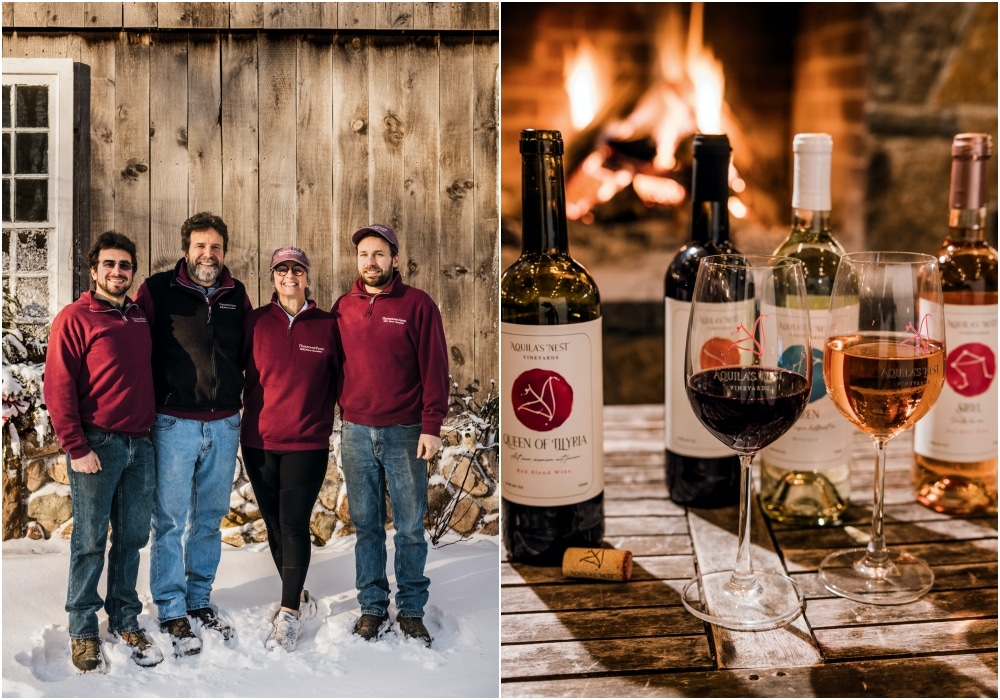
Photo Credit : Michael Piazza
Neviana Zhgaba and her husband and winemaker, Ardian Llomi, have poured creative energy into the property they fell for in 2016 and opened to the public in the fall of 2020. From a single firepit, they’ve “expanded more and more,” Zhgaba says. Reserve a tasting room table, a heated igloo or pergola, or the ultimate spot: the Forbidden Fireplace, where you can feel the warmth of the stone hearth. Or check the calendar for a nonstop lineup of events, live music, and create-your-own-holiday-gift workshops.
There’s an underlying theme in the vineyard’s art and attitude: women’s empowerment. For Zhgaba, success beyond their wildest expectations isn’t measured just in the statewide accolades that Aquila’s Nest has received. It’s in the dozens of other women-owned enterprises she’s been able to support. In the vineyard’s achievement of climate-neutral certification. And in the joy she sees on the faces of wintertime visitors. aquilasnestvineyards.com
Kim Knox Beckius
Kim Knox Beckius is Yankee Magazine's Travel & Branded Content Editor. A longtime freelance writer/photographer and Yankee contributing editor based in Connecticut, she has explored every corner of the region while writing six books on travel in the Northeast and contributing updates to New England guidebooks published by Fodor's, Frommer's, and Michelin. For more than 20 years, Kim served as New England Travel Expert for TripSavvy (formerly About.com). She is a member of the Society of American Travel Writers (SATW) and is frequently called on by the media to discuss New England travel and events. She is likely the only person who has hugged both Art Garfunkel and a baby moose.
More by Kim Knox Beckius

